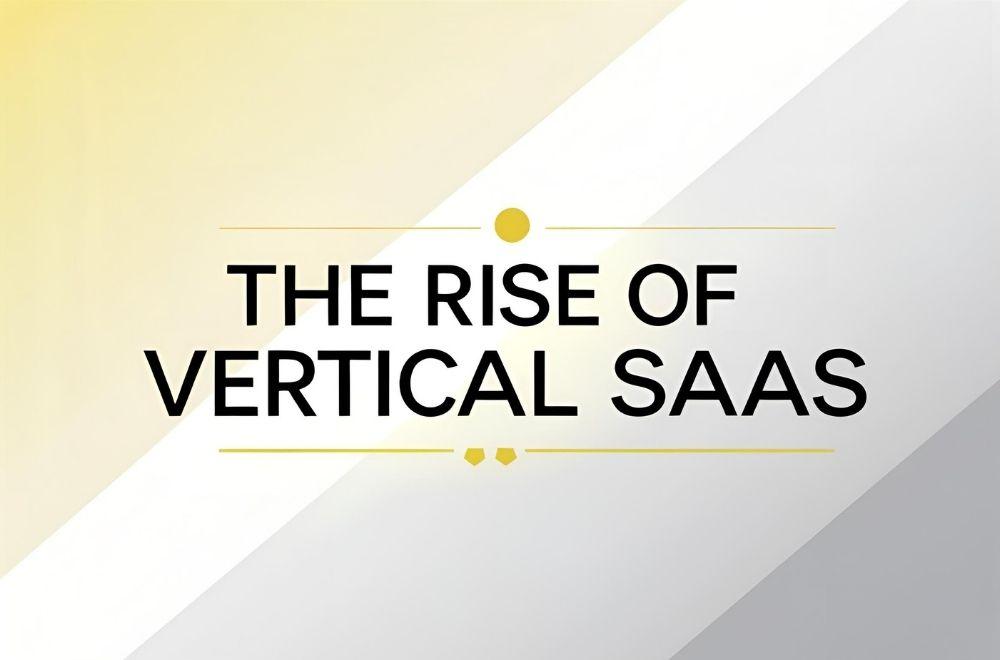As the UAE cements its reputation as a global technology hub, one trend stands out within the business software landscape: the rapid rise of vertical SaaS. These industry-specific platforms—designed to meet the needs of sectors like healthcare, logistics, real estate, and finance—are quietly transforming how businesses operate, serve customers, and scale. Unlike horizontal SaaS platforms that offer general tools to a wide range of users, vertical SaaS products dive deep into one industry’s workflows, regulations, and challenges.
In the UAE, this model is finding fertile ground. Backed by cloud-friendly regulations, strong digital adoption across industries, and increasing investor appetite, vertical SaaS is no longer a fringe play—it’s a major force reshaping the B2B technology landscape. From AI-driven medical claims platforms to logistics SaaS built for last-mile delivery, the local market is teeming with purpose-built solutions. These platforms don’t just help businesses digitise—they provide a competitive edge by embedding domain expertise directly into the software.
Why Vertical SaaS Is Gaining Ground in the UAE
From General to Specific: How SaaS Is Evolving
As SaaS matures globally, businesses are shifting from generic platforms to specialised tools tailored for their specific industries. Vertical SaaS platforms don’t just solve surface-level needs—they’re crafted to embed into complex, sector-specific workflows. This depth of integration is driving demand across the UAE.
The Cloud-First UAE Landscape
The UAE’s appetite for specialised software is accelerating thanks to supportive national policies and widespread cloud adoption. Digital transformation strategies have paved the way for widespread SaaS implementation, with government support bolstering the shift.
The country’s SaaS spending is expected to grow from 20.16 billion (USD 5.49 billion) in 2022 to over 102 billion (USD 30 billion) by 2029.
A Fertile Ground for Vertical Innovators
The UAE’s startup ecosystem reflects this growth.
More than 680 vertical SaaS companies now operate across the Emirates, with over 550 headquartered in Dubai. Each year, more than 30 new ventures launch, focusing on solving highly specific business challenges, which demonstrates the vibrancy of the market.
Where Investors Are Seeing the Most Promise
Funding Trends Point to Strong Growth
Over 810 billion (USD 220 million) has been invested in vertical SaaS startups in the UAE over the past decade.
Despite global slowdowns, 2021 and 2022 each saw close to 184 billion (USD 50 million) in disclosed deals, while 2023 and 2024 continued to deliver steady investment figures, showcasing the resilience of the market.
Late-Stage Confidence and Market Maturity
As the vertical SaaS market matures, Series A and B rounds are becoming more common. At least 12 UAE-based startups have reached Series B or later, showing that investors see real long-term potential in this space. Backers include regional VCs and international firms such as 500 Global and SoftBank.
Exit Opportunities Are Emerging
Acquisitions are beginning to shape the market. Deals such as Property Monitor’s acquisition by Cavendish Maxwell and BLOOVO’s sale to KABI Technologies reflect increasing consolidation and show that strategic buyers are actively seeking specialised SaaS capabilities.
How Key Industries Are Transforming with Specialised Platforms
Healthcare: Reducing Friction in Claims and Compliance
Hospitals and clinics are adopting cloud-native tools to automate claims management and streamline patient finance workflows. Startups like Klaim are leading the charge with AI-driven software that accelerates insurance reimbursements and ensures regulatory compliance. Klaim’s 36,730,000 (USD 10 million) Series A round highlights investor belief in this highly specialised segment.
Logistics: Delivering Efficiency in Real Time
Dubai’s position as a logistics gateway has accelerated the need for smarter delivery and fleet management. Lyve’s platform offers AI-based route optimisation, order tracking, and driver coordination—all features tailored for last-mile delivery in the Middle East. These tools are proving essential for e-commerce and retail operations under pressure to perform.
Real Estate: Digitising the Entire Property Lifecycle
The property market in the UAE is embracing SaaS platforms that go beyond listings. Property Finder’s CRM and analytics suite enables brokers and developers to manage leads, campaigns, and transactions within a single tool. Its focus on the regional real estate environment has turned it into a pillar of PropTech in the GCC.
Vertical vs Horizontal SaaS in the UAE
How They Differ in Use and Impact
Horizontal SaaS tools serve general business needs—email, communication, HR, or customer support—and are widely adopted across UAE businesses. But their one-size-fits-all model can fall short in industries with complex workflows or compliance burdens.
The Rise of Hybrid Software Stacks
Many companies in the UAE are choosing to blend both models. They use horizontal platforms for day-to-day tasks and deploy vertical SaaS to handle mission-critical operations. This adaptive approach enables businesses to scale efficiently while staying aligned with local regulatory and operational nuances, fostering optimism about the future of the industry.
Why Specialisation Builds Stickiness
Vertical SaaS platforms tend to enjoy stronger customer retention. Their deep functionality, prebuilt compliance features, and domain alignment make switching costly, creating durable customer relationships that investors and founders both value.
Meet the Companies Driving Innovation
Property Finder: Powering Real Estate Growth
With over 514,220,000 (USD 140 million) in funding, Property Finder is more than a portal—it’s a full-stack CRM and analytics solution for property professionals in the UAE. It brings together listing management, lead scoring, and marketing tools in a way that reflects how real estate actually operates in the region.
Lyve: Smart Logistics for the Gulf
Lyve offers logistics SaaS designed specifically for the GCC. With features like route automation, driver apps, and real-time delivery dashboards, it’s solving local fulfilment challenges head-on. Its 514,220,000 (USD 35 million) Series B round speaks to its strong market fit.
KASO and Klaim: Serving F&B and Healthcare
KASO is helping restaurants digitise supply chains through supplier communication and invoice tracking tools. Klaim, on the other hand, helps clinics streamline claims and manage cash flow. Both serve heavily regulated, operationally complex industries where generic software falls short.
Pemo: Finance Tools for GCC SMEs
Pemo’s spend management SaaS combines corporate cards, expense tracking, and approval workflows in one platform. It’s built for regional SMEs navigating cross-border payments and local compliance—an example of fintech going vertical in the UAE.
Regulatory and Operational Realities
Data Residency: A Make-or-Break Issue
For vertical SaaS players in healthcare, finance, or government, hosting data in the UAE isn’t optional—it’s mandatory. National regulations, particularly the federal Data Protection Law, require sensitive data to remain within borders. This has driven demand for local hosting via AWS, Azure, and regional cloud providers.
Sector-Specific Compliance Requirements
Each vertical comes with its own rulebook. Healthcare SaaS must align with the Ministry of Health protocols. Financial SaaS tools need to meet Central Bank cybersecurity and data handling requirements. Real estate CRMs must support RERA documentation. Compliance isn’t a feature—it’s core functionality.
The Complexity of Integration
Many organisations still rely on legacy systems. This makes integration a key barrier for adoption. Vertical SaaS vendors that can plug into existing ERPs, databases, and government APIs have an edge. Interoperability and onboarding support are increasingly non-negotiable.
Building Trust Through Reliability
Downtime in a logistics or healthcare platform is not just an inconvenience—it’s a financial and reputational risk. To win over enterprise customers, vertical SaaS providers must offer world-class uptime, SLAs, and security protocols. This is especially true when customer data is involved.
What the Future Holds for Vertical SaaS in the Emirates
AI Integration Will Define the Next Wave
Vertical SaaS platforms are sitting on highly valuable, structured data. This makes them prime candidates for AI innovation. Whether it’s automated claims adjudication, dynamic pricing in real estate, or predictive routing in logistics, the UAE’s leading SaaS firms are moving beyond automation to decision-making.
New Sectors on the Horizon
Education, construction, energy, and agriculture are next in line for SaaS disruption. As these sectors digitise, the demand for tools tailored to their operational and regulatory frameworks will increase. Vertical SaaS providers with sector expertise will be best placed to capitalise.
International Expansion Through Regional Proximity
Saudi Arabia, Egypt, and Southeast Asia offer natural growth markets for UAE-built SaaS platforms. Similar infrastructure, business models, and regulatory challenges create an opening for regional leaders to scale cross-border and dominate verticals across the Middle East and beyond.
Why Now Is the Time to Build in Vertical SaaS
The UAE’s business landscape is ripe for a vertical SaaS explosion. Regulatory frameworks, digital transformation policies, and investor confidence are aligning to create fertile ground for startups that thoroughly understand their industries. These platforms don’t just digitise—they reshape how sectors operate.
For founders, the opportunity lies in pairing deep domain knowledge with world-class product execution. For investors, vertical SaaS offers defensible market positions, long-term retention, and compelling exit potential. For customers, these tools represent a significant leap forward in efficiency, compliance, and competitive edge.
As the UAE positions itself as a launchpad for regional and global innovation, vertical SaaS will play a pivotal role in shaping the next phase of growth. The businesses that build for depth—not just scale—will shape the next decade of software in the Emirates.


